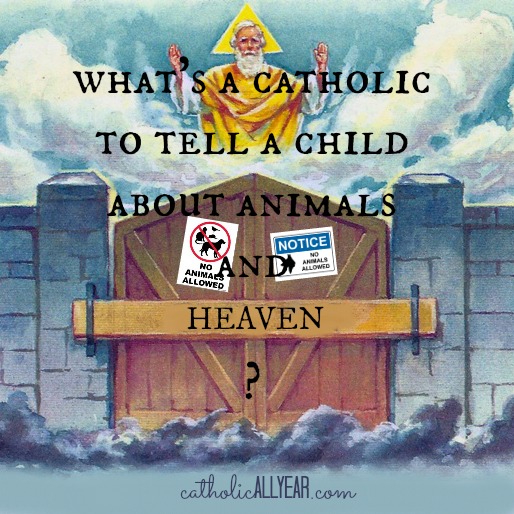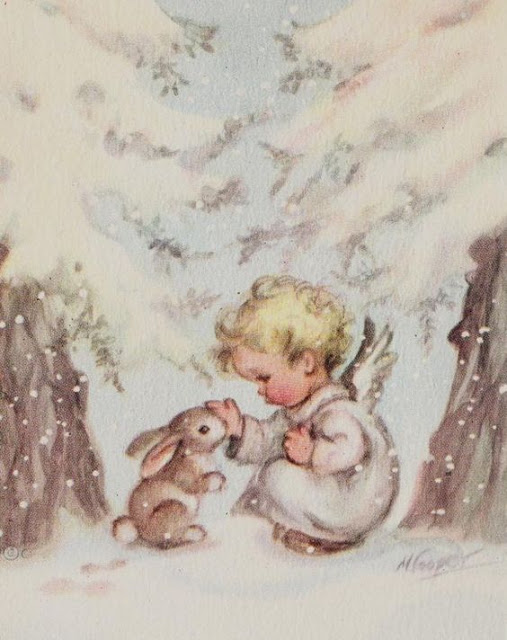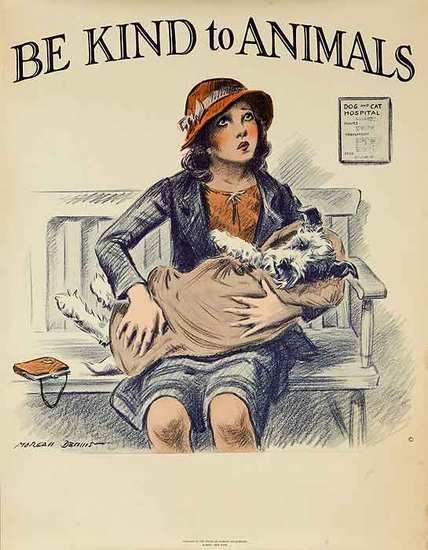Hello, my name is Mollie and I am a big fan of your blog. I lost my pet of 17 years this weekend and I am struggling with the thought of breaking the news to my seven year old son this afternoon. We have been preparing him for her passing as she has been showing signs that her end was near but I want to be sure we honor any questions our son has on “where do pets go when they die” in a good Catholic way. How do you explain the passing of pets to your children?
 |
| Image from the St. Joseph First Communion Catechism, with smart alecky additions by me. |
The Answer:
Mollie, I’m sorry for your loss.
First step, I think, is to not rush into answering questions your son doesn’t ask. But, you are right to be prepared, just in case, of course. I would give him the facts about the where and when and how of the death, and comfort him and allow him to grieve and he can ask questions if he wants to.
I just listened to an autobiography with the kids, called Little Britches, about a boy growing up on a Colorado ranch. In the book the boy’s dad says we only have to be sad about creatures who die without having fulfilled their purpose. Your pet was loved and taken care of and gave love and companionship for seventeen years. That certainly sounds like a purposeful life.
That might be enough for your son.
As for what the Catholic Church teaches, there isn’t an official Church doctrine as to whether there are animals in heaven. Individual animals have an animating soul, but are not capable of choosing God in the way that humans are. The traditional teaching is that animals do not have an immortal soul and therefore, when they die, nothing remains of them. They just go out of existence.
St. Thomas Aquinas, for example, taught that . . .
Thesis XIV. Souls of the vegetative [plant] and sensitive [animal] order, properly speaking, do not
subsist and are not produced, but merely exist and are produced as a principle whereby the living thing exists and lives. Since they depend entirely on matter, at the dissolution of the compound, they are indirectly destroyed.
Thesis XV. On the contrary, the human soul subsists by itself, and is created by God when it can be infused into a sufficiently disposed subject, and is incorruptible and immortal by nature.
The news headlines a year or so back saying that Pope Francis had said animals go to heaven were a complete fabrication. The pope simply stated that the entire universe will be renewed, echoing a statement by St. Paul (Rom 8:21).
However, some people, including C.S. Lewis (not Catholic, but very very close, theologically), do think that animals could be in heaven. Not by their own merits, but because of their relationship with humans, just as humans can be in heaven through our relationship with God.
If, nevertheless, the strong conviction which we have of a real, though doubtless rudimentary, selfhood in the higher animals, and specially in those we tame, is not an illusion, their destiny demands a somewhat deeper consideration. The error we must avoid is that of considering them in themselves. Man is to be understood only in his relation to God. The beasts are to be understood only in their relation to man and, through man, to God. . . .
Man was appointed by God to have dominion over the beasts, andeverything a man does
to an animal is either a lawful exercise, or a sacrilegious abuse, of an authority by divine right. The tame animal is therefore, in the deepest sense, the only “natural” animal – the only one we see occupying the place it was made to occupy, and it is on the tame animal that we must base all our doctrine of beasts. . . .And in this way it seems to me possible that certain animals may have an immortality, not in themselves, but in the immortality of their masters. . . .
It makes God the centre of the universe and man the subordinate centre of terrestrial nature: the beasts are not co-ordinate with man, but subordinate to him, and their destiny is through and through related to his. And the derivative immortality suggested for them is not a mere amende or compensation: it is part and parcel of the new heaven and new earth, organically related to
the whole suffering process of the world’s fall and redemption.
But no matter what . . .
There wouldn’t be any problem in saying that IF it would make his happiness in heaven complete, certainly your son would see his pet again, because that’s true.
We would each have complete happiness in heaven, so anything that his happiness requires will be there. But most theologians would argue that the beatific vision of God and an understanding of the whole purpose of the universe and God’s plan for our lives is all anyone would need for perfect happiness in heaven.
I like this way of looking at it, by Paul Thigpen:
God might choose to keep at least some animal “souls” from perishing after death, by granting them a privilege beyond their nature — what is known as a preternatural gift.
In any case, we know this much: Because animals can’t have sanctifying grace in their souls to receive the beatific vision, then if any of them do go to heaven, it wouldn’t be for the same reason that humans are in heaven.
What other reasons might there be? Perhaps it’s possible that God will allow the animals we’ve loved on earth to take part somehow in our heavenly life as part of our eternal happiness.
In fact, since God himself takes delight in all the good creatures he’s made, he might give at least some animals a life in heaven for the sake of his own pleasure.
We can only speculate; we won’t know for sure until, God-willing, we arrive in heaven ourselves.
Whatever the case may be, we can be assured that God loves every creature he makes. He loves them even more than we do.
That can be a comforting thought when we’re saddened to lose a dear pet or see some other living creature die. Because God loves them, we can entrust them to him.
60 reasons ‘All Dogs Go to Heaven’ is the most disturbing kids’ movie ever made
Disclaimer: I am not a theologian, nor am I an official spokesperson for the Catholic Church. (You’re thinking of this guy.)
If you read anything on this blog that is contrary to Church teaching,
please consider it my error (and let me know!). I’m not a doctor or an
expert on anything in particular. I’m just one person with a lot of
experience parenting little kids and a desire to share my joy in
marriage, mothering, and my faith.








